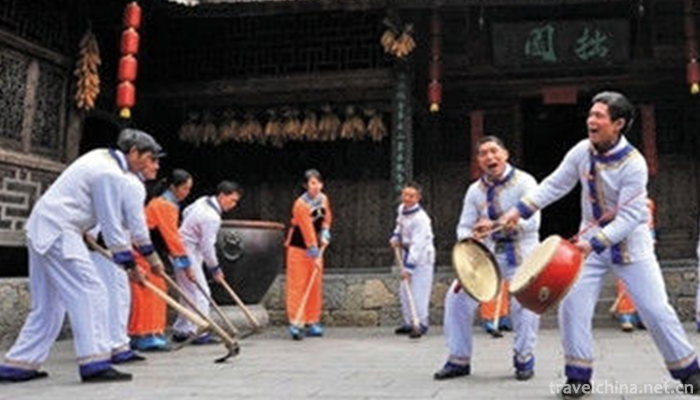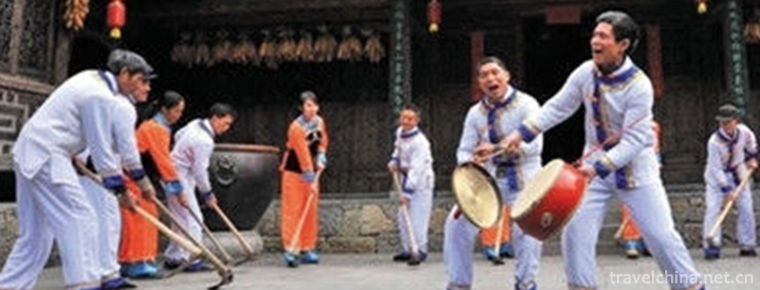Youyang Ancient Songs
Youyang Ancient Songs
Youyang Ancient Songs are the words chanted or chanted by sorcerers in the activities of ancestor worship, praying for high yield, exorcising evil spirits and returning vows. The Youyang Tujia and Miao Autonomous County of Chongqing, which is located at the junction of Hunan, Hubei, Chongqing and Guizhou, is the product of the continuation and evolution of the ancient culture of the South in the Wuling Mountains.
On May 23, 2011, Youyang Ancient Songs declared by Youyang Tujia and Miao Autonomous County of Chongqing City were approved by the State Council as the third batch of national intangible cultural heritage lists.
historical origin
Youyang Ancient Song (i.e. Wu Nuo Poetry) belongs to the category of witch culture. It is now mainly spread in Youyang Tujia and Miao Autonomous County of Chongqing, which is located at the junction of Hunan, Hubei, Chongqing and Guizhou. It is the product of the continuation and evolution of the ancient culture of the South in Wuling Mountains. It is also the legal activity of Tujia Wizard Nuo Master (Tima) - worship of ancestors, pray for plentiful production and exorcise evil spirits. The rhetoric recited or sung in the activities of vow-returning has a sophisticated style. It has a history of about 6,000 years. Its origin can be traced back to the witchcraft songs of ancient times. It is a collection of natural and social knowledge accumulated by the working people for a long time.
Words chanted or chanted by Nuo sorcerers in ancestor worship, praying for plentiful harvest and exorcising evil spirits are spread in Youyang Tujia and Miao Autonomous County. The origin of these words can be traced back to ancient times, and they are a collection of natural and social knowledge accumulated by the working people for a long time. Youyang Ancient Songs have two free verses and two verses and one verse, four verses and one verse rhyming metrical style, mostly four-character and seven-character sentence pattern, interspersed and connected, there are two kinds of arias, high and flat.
primary coverage
Words chanted or chanted by Nuo sorcerers in ancestor worship, praying for plentiful harvest and exorcising evil spirits are spread in Youyang Tujia and Miao Autonomous County. The origin of these words can be traced back to ancient times, and they are a collection of natural and social knowledge accumulated by the working people for a long time. Youyang Ancient Songs have two free verses and two verses and one verse, four verses and one verse rhyming metrical style, mostly four-character and seven-character sentence pattern, interspersed and connected, there are two kinds of arias, high and flat.
Youyang Ancient Songs have two free verses and two metrical verses at the end of one and four sentences, most of which are four-character and seven-character sentences, interlaced and connected. There are two kinds of singing, high-pitched and flat-pitched, quite charming. The chanting content depends on the nature of the ceremonies presided over. There are chapters such as divine dancing and inviting teachers, building bridges, inviting souls, hiding, shading, building family money first, making promises, sending Maoshan to God, etc. They are handed down orally, with fixed words and few improvisations. Youyang Ancient Songs can be divided into divine and living categories. Its representative works are: hymn "Qitian is the King of Qi in Dongyue", custom poem "Hiding in the Shadow", rhetoric poem "Four Seasons of the Year" and so on.
artistic characteristics
Thematic form
Judging from the style of Youyang Ancient Songs, there are two free verses and two metrical verses at the end of one and four sentences, most of which are four-character and seven-character sentences, interlaced and connected. There are two kinds of singing tunes: high-pitched and flat-pitched.
Content characteristics
1. The content is determined by the nature of the activity, and there are many chapters.
2. Fixed content and literary heritage;
3. It can be divided into divine and living categories.
4. The representative works include hymns, custom poems and final poems.
5. Including historical stories, there is also a breath of life.
6. Based on nature worship, ancestor worship and ghost worship.
7. Sacrifice verses of mixed Confucianism, Taoism and Buddhism.
The content of Youyang Ancient Song depends on the nature of the ceremony. It mainly consists of chapters such as divine jumping, inviting teachers, building bridges, inviting souls, hiding, falling clouds, building money first, making promises, sending Maoshan, sending gods, etc. It is handed down from mouth to mouth with fixed words. Youyang Wu Nuo poems are divided into divine and living categories. Its representative works are: hymn "Qitian in Dongyue is the King of Qi"; custom poems "Hide in the Shadow", "Ming Luo Huibing"; and rhetoric poems "Four Seasons of the Year". Including human origins, ethnic migration and heroic legends; and also breath of life, such as family activities of exorcising evil spirits and vows, including Shenwen Sheng, Yingbing bridge, water kitchen stove, hanging to dispel evil spirits, restoring God and restoring fragrance, sweeping and kicking knives and other procedural chapters. Wunuo poems are based on nature worship, ancestor worship and ghost and God worship, mixed with sacrificial verses of Confucianism, Taoism and Buddhism.
Literary Connotation
Witchcraft is rich in color (contact with Tima culture); 2) as the transmission of the soul of the deceased; 3) as a bridge for ordinary people to express their prayers.
Current situation of inheritance
Youyang Ancient Songs, carrying ancient myths, are the first-hand valuable materials for the study of the customs and customs of the Chinese nation and the development of literature and art. With the change of society and the innovation of popular ideas, the activities of folk rituals are gradually decreasing, and there are few Timas engaged in this profession. Youyang Ancient Songs are on the verge of extinction and need to be rescued and protected urgently.
The State Council has promulgated three national intangible cultural heritage protection catalogues, Youyang Hand-waving Dance, Youyang Folk Song and Youyang Ancient Song. All the pictures and videos are reported by the Cultural Museum to the county, city and State Council step by step to declare success, but the declared funds for each project are pitiful (20,000 yuan, making a standard). The filing videos are not enough. At present, we still owe 45,000 yuan for the filing materials of Youyang Ancient Songs, which needs to be solved by the county government. Chongqing has 39 national intangible cultural heritage protection lists, ranking second in 40 districts and counties.
Inheritance Significance
Youyang Ancient Songs have been handed down from mouth to mouth, with fixed diction and less improvisation. They preserve a large number of original information and artistic factors. They are an ancient and magnificent treasure house of folk literature. As the third batch of "non-heritage" at the national level, it will be protected and play a role in promoting the spread of regional culture and traditional culture.
On May 18, 2010, the Ministry of Culture of China announced the third batch of national intangible cultural heritage list of recommended projects (new entries). The "Youyang Ancient Songs" declared by Youyang Tujia and Miao Autonomous County of Chongqing City were selected as intangible cultural heritage in the category of folk literature projects.


-
1.Zhengzhou Xiao Ji stewed noodles
Zhengzhou Xiao Ji stewed noodles,Xiao Honghe, the founder of Xiao Ji Yanmian, was a master of Yifumian at Changchun State-owned Hotel in Zhengzhou.
Time 2018-11-26 -
2.Turtle Head Islet
Yuantouzhu is a peninsula lying on the northwest coast of Taihu Lake in Wuxi. It is named for its huge stone bursting into the lake in the shape of a tortoise with its head held high. Yuantouzhu
Time 2018-12-06 -
3.qingming riverside landscape garden
Qingming Shanghe Garden is a large Song Dynasty cultural theme park constructed by the people's government of Kaifeng City in Henan Province
Time 2018-12-09 -
4.Block door La shou men
Stopper Gate is one of the traditional Chinese boxing schools. It originated in Shaolin and was introduced to Tianjin in the early Qing Dynasty. It originated in Sichuan. It was the earliest southern
Time 2019-05-10 -
5.Legend of the ancestors of Khitan
The legend of the ancestors of Qidan is a folk legend that is spread in Pingquan County, Hebei Province, China. According to legend, the ancestors of Qidan were born on the Futu River in Mayushan
Time 2019-06-10 -
6.Suni embroidery of the Yi nationality
Sani embroidery is a unique technology with a long history. There are many kinds of flower picking techniques, such as picking, embroidering, filling, receiving, buttoning, single-sided picking and do
Time 2019-07-12 -
7.Henan Opera
Henan Opera, originating in the Central Plains (Henan), is one of the five major Chinese operas and the largest local opera in China. Contemporary Henan Opera has followed Henan Satellite TV, Henan He
Time 2019-07-16 -
8.The world is so big still meet you Cheng Xiang Tik Tok Songs 2020 Hot Songs
"The world is so big still meet you " is composed by htet Aung Lwin and sung by Cheng Xiang. It is the Chinese version of myanmar music "for Ma". It was officially released on Janu
Time 2020-05-21 -
9.Luodai Ancient Town
Luodai Ancient Town is located in Longquanyi District, Chengdu City, Sichuan Province, with a total area of more than 20000 square meters. Luodai Ancient Town is a national historical and cultural town and one of the five "Dongshan five fields" in Chengdu.
Time 2020-11-05 -
10.Suining transportation
Suining is a transportation hub city in Sichuan Province, with an equal distance of 128 km between Suining and Chengdu Chongqing. It is an important node city and secondary comprehensive transportation hub between Chengdu and Chongqing. 237km "3-way 7-line" railway
Time 2020-12-16 -
11.Leshan social service
By the end of 2018, there were 13 social welfare homes in Leshan City with 2908 beds and 2182 people in the hospital. The sales of social welfare lottery tickets totaled 385.69 million yuan, raised 109.75 million yuan of welfare lottery public welfare fund,
Time 2020-12-17 -
12.Dazhou Communications
In 2019, the postal and telecommunication business income will be 3.103 billion yuan; at the end of the year, there will be 706600 fixed phone users and 4.1544 million mobile phone users, including 177600 3G mobile phone users and 2.9382 million 4G mobil
Time 2020-12-20